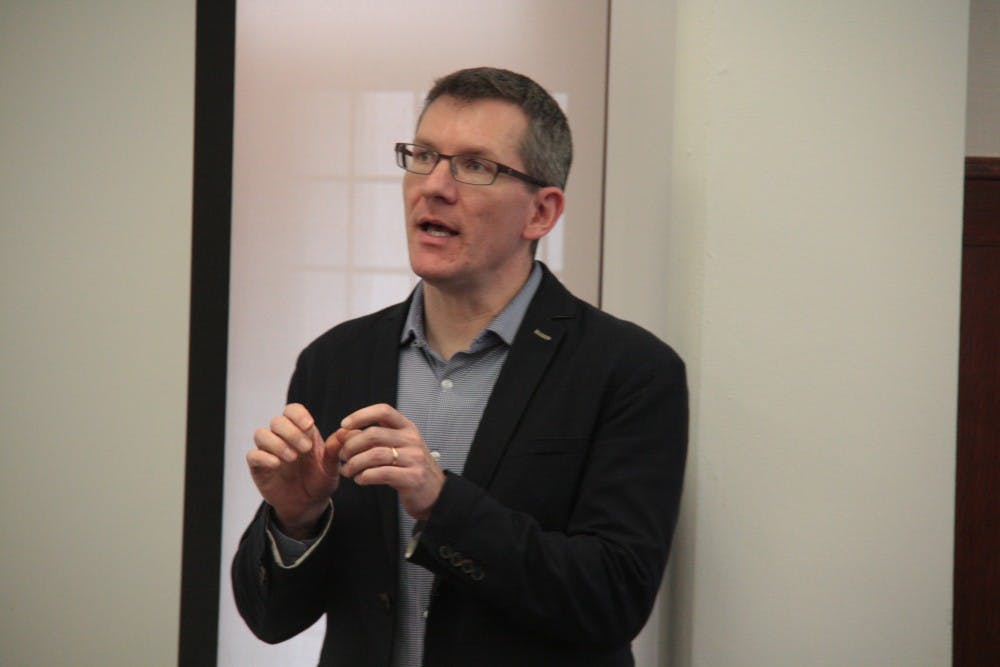In a lively talk on Wednesday afternoon, Christianity Today Executive Editor Andy Crouch broached a topic not often discussed in Christian circles: white supremacy.
Crouch spoke about the Christian perspective on racism and human trafficking as part of a weekly series hosted by the Penn Faculty-Staff Christian Forum that concentrates on various topics regarding faith and relevant societal issues.
“Today, even though slavery is completely illegal, even though no government in the world even wants to admit that slavery is happening in their country, it is happening in essentially every country,” Crouch said. “What do we do about that? How will we, including those of us who are Christians, respond to these realities?”
Crouch guided the audience through an understanding of white supremacy as the legacy of institutional racism and slavery.
He defined white supremacy as being “the comprehensive, ideological advancement of a belief in the inherent superiority of that white race, and in the construction of social systems that allowed ... that white race to experience itself and perpetuate itself as powerful in the world.”
“More people were actually trafficked through violence in a system ... [called] modern-day forced labor. But there are more people — people in this room, everyone in this campus, everyone in this city — caught in the institutional legacy of white supremacy.”
While both modern-day forced labor and the legacy of white supremacy have no “legal or even ideological legitimacy today in any great measure,” these issues continue to “persist powerfully,” he said.
Crouch said that Christians, especially “white Christians” can respond to such issues by first thinking institutionally about change and ways to think more “imaginatively” about available resources.
“I think the problem with ... white Christians ... is that we tend to reduce ... the whole story of abolition to inspiring individual actors without thinking or attending to the profound institutional implications of what they did and what had to be done.”
Crouch also said that fundamentally, “we need to recover the image of God” in order to address the realities of human exploitation and modern-day slave labor. He emphasized understanding the two unique qualities that drive all humans: authority, the capacity for meaningful action, and vulnerability, the capacity for meaningful risk.
Crouch’s invitation on behalf of the Penn FSCF shows a commitment of the Christian faculty, as well as Penn graduate students, to opportunities to integrate faith with their academic and professional lives.
Michael Atchison, a biochemistry professor at the School of Veterinary Medicine and part of the FSCF leadership, said that Andy Crouch was invited to speak as a part of an ongoing dialogue on other forms of oppression not limited to racism.
“The series that we’re doing now flowed out of discussions we had probably last spring, maybe around April ... there had been the riots in Baltimore, there was the shooting in Ferguson, [Miss.] and it just seemed that this was an issue that many people were struggling with,” Atchison said.
During his address, Crouch used a two-by-two graphic to explain how a distortion of the authority-vulnerability dynamic enabled perpetrators of human trafficking and oppression to sustain their violence.
“I want to suggest that when you have authority and vulnerability together, you have flourishing,” Crouch said. “What if you could shed a lot of the vulnerability of that agricultural system onto people who cannot resist force of violence? That is slavery.”
Among the crowd of primarily professors and administrators, Wharton junior Steph Virbitsky and Nursing junior Kirsten Garza were among the few undergraduate students in attendance.
Virbitsky, who heard about the event through Dave DeHuff, an administrator for the FSCF, praised the event’s message.
“I’m really passionate about seeing the end of human trafficking,” she said.
Garza was inspired to attend the event after taking a class on impact intervention, and like Virbitsky, is a member of Penn Cru, a Christian fellowship group.
“Also, hearing Andy Crouch speak was an incredible opportunity,” she said.
“Tying in Christianity into our view of [human trafficking] is very important to me and just kind of seeing how that relates to what I believe,” Garza added. “I guess for me faith plays a role in pretty much just about everything I do but obviously here at Penn there’s a very intellectual side of it as well that I’m definitely still learning about because I don’t always think of things in that way.”
Atchison applauded the event as another way to invite dialogue on oppression in its myriad forms.
“We wanted to consider all forms of oppression,” he added. “Every individual is created in the image of God and they’re all valuable, and these people who are caught in abusive circumstances ... it’s not a small number.”









